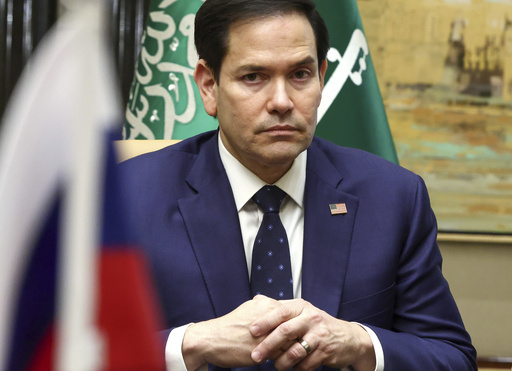
U.S. and Russia Initiate Talks to Address Ukraine Conflict
In a notable shift in diplomacy, high-ranking officials from Russia and the United States convened in Riyadh, Saudi Arabia, to explore pathways toward ending the ongoing conflict in Ukraine and enhancing bilateral relations. This meeting reflects a significant turnaround in U.S. foreign policy under President Donald Trump, as articulated by U.S. Secretary of State Marco Rubio after the discussions. He elaborated that both nations have set out three primary objectives: to restore embassy staffing levels in Washington and Moscow, to establish a high-level team dedicated to facilitating peace talks concerning Ukraine, and to investigate opportunities for closer economic cooperation.
Rubio emphasized that this meeting marks the beginning of an ongoing dialogue, underlining the need for further action. His Russian counterpart, Sergey Lavrov, affirmed the sentiment, describing the conversations as productive and constructive. They were joined by other senior officials from both sides, including Trump’s national security adviser and a special Mideast envoy. It’s worth noting, however, that no representatives from Ukraine participated in this session, raising eyebrows given the current dire situation in Ukraine as it gradually cedes ground to better-resourced Russian forces.
Ukrainian President Volodymyr Zelenskyy expressed strong dissatisfaction about being excluded, declaring that any outcomes from the talks would be unacceptable in Ukraine’s absence. He subsequently decided to postpone his own trip to Saudi Arabia. Concern has also grown among European allies about potentially being marginalized in the discussions.
During his remarks, Trump expressed little sympathy for Ukraine’s situation, stating that he believed Ukrainian leadership should have made earlier concessions to avoid the current conflict. He criticized the Ukrainian government for not having resolved the situation sooner, indicating that opportunities for negotiating peace had been overlooked in the past. This attitude signals a sharp contrast to the approach taken during the Biden administration, which led international efforts to diminish Russia’s standing globally.
The relationship between Russia and the U.S. has deteriorated significantly in recent years, especially after Russia’s annexation of Crimea in 2014 and subsequent military actions in Ukraine. In response, the U.S. and its European partners have imposed extensive sanctions aimed at crippling the Russian economy, and both nations have faced the expulsion of numerous diplomats from each other’s embassies.
Rubio indicated that resolving the Ukraine conflict could lay the groundwork for future collaborations on issues of mutual interest, which could ultimately benefit global relations and patch up ties with Russia. He mentioned that the recent talks may facilitate a forthcoming summit between Trump and Putin, although no specific date has yet been agreed upon for this meeting.
Lavrov echoed Rubio’s sentiments, reiterating the shared goals between the two nations and highlighting plans for appointing representatives to conduct regular consultations concerning Ukraine. He noted a growing comprehension from the U.S. perspective regarding Russia’s stance, suggesting a potential thawing in relations.
In the meantime, the absence of Ukrainian officials at these talks has sparked alarm, especially as it appears that the U.S. is pursuing a diplomatic path that could exclude key allies. The importance of involving Kyiv in any negotiations was a cornerstone of the Biden administration’s foreign policy framework.
Both Rubio and U.S. State Department representatives confirmed that discussions would continue with Ukraine and European allies, although the focus remains on the Russian side’s role in achieving peace. Additionally, U.S. Defense Secretary Pete Hegseth raised doubts about the feasibility of NATO membership for Ukraine, suggesting that full territorial recovery from Russia may not be attainable—points that align with Kremlins objectives.
Amidst these developments, the ongoing violence in Ukraine persists. According to Ukrainian military reports, Russian forces launched a large-scale drone attack, which resulted in civilian injuries and significant damage in various regions. It reflects the challenges that lie ahead as diplomatic attempts to resolve the conflict continue to unfold on the international stage.
Meanwhile, the meeting itself showcased Saudi Arabia’s ambitions to be an influential diplomatic player in the region. Crown Prince Mohammed bin Salman has been actively engaged in maintaining relations with Russia during the conflict and has facilitated negotiations involving prisoner exchanges. As for Ukraine’s leadership, Zelenskyy has opted to reschedule his anticipated visit to Saudi Arabia, signaling his intent to avoid any association with the discussions that did not include Ukrainian participants. The persistence of the conflict serves as an ongoing backdrop to these intricate diplomatic maneuvers and their implications for future peace efforts.

